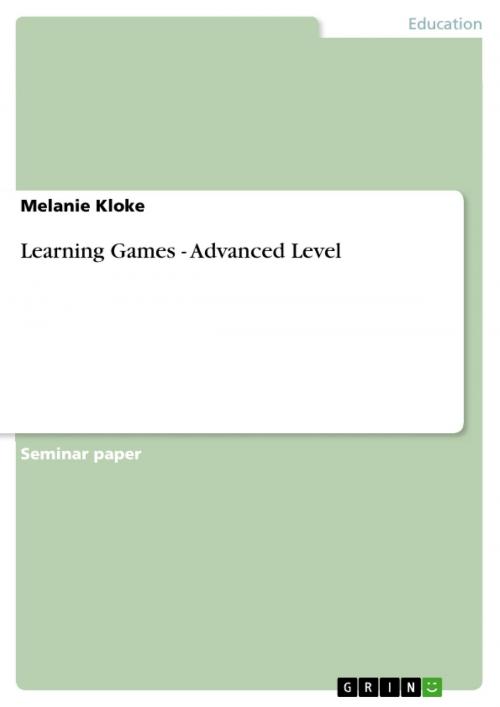Learning Games - Advanced Level
Advanced Level
Nonfiction, Reference & Language, Study Aids, ESL, Foreign Languages| Author: | Melanie Kloke | ISBN: | 9783638486903 |
| Publisher: | GRIN Publishing | Publication: | April 6, 2006 |
| Imprint: | GRIN Publishing | Language: | English |
| Author: | Melanie Kloke |
| ISBN: | 9783638486903 |
| Publisher: | GRIN Publishing |
| Publication: | April 6, 2006 |
| Imprint: | GRIN Publishing |
| Language: | English |
Seminar paper from the year 2005 in the subject English - Pedagogy, Didactics, Literature Studies, grade: 1,3, University of Paderborn (Fakultät für Kulturwissenschaften), course: Proseminar: Language Games, 7 entries in the bibliography, language: English, abstract: Learning a foreign language is always based on developing, improving and practising the four basic skills reading, speaking, listening and writing. Therefore, pupils have to imitate their teacher and repeat certain given patterns again and again to learn and get used to the spelling and pronunciation of the target language. This can, if always done in the same way, cause monotony and boredom among the learners and can lead to a low motivation. To avoid this development, teachers should try to involve as much activity and variations as possible to make the lessons more lively. Using games in the classroom can support the vitality of the learning process a lot and can help to motivate the pupils. They can be a good alternative to repetition drills or teacher centred lessons and can not only be helpful for teaching beginners a foreign language, but also to make lessons of advanced learners more varied. But, of course, a lot of facts have to be borne in mind and to be considered when games shall be integrated in the lesson. The following implementations will contain information about what games actually are, why they should be used and what is important to be aware of if they are used. Furthermore, the type of learning games and their advantages for advanced learners will be discussed. Finally, examples for learning games in advanced groups will be given and explained.
Seminar paper from the year 2005 in the subject English - Pedagogy, Didactics, Literature Studies, grade: 1,3, University of Paderborn (Fakultät für Kulturwissenschaften), course: Proseminar: Language Games, 7 entries in the bibliography, language: English, abstract: Learning a foreign language is always based on developing, improving and practising the four basic skills reading, speaking, listening and writing. Therefore, pupils have to imitate their teacher and repeat certain given patterns again and again to learn and get used to the spelling and pronunciation of the target language. This can, if always done in the same way, cause monotony and boredom among the learners and can lead to a low motivation. To avoid this development, teachers should try to involve as much activity and variations as possible to make the lessons more lively. Using games in the classroom can support the vitality of the learning process a lot and can help to motivate the pupils. They can be a good alternative to repetition drills or teacher centred lessons and can not only be helpful for teaching beginners a foreign language, but also to make lessons of advanced learners more varied. But, of course, a lot of facts have to be borne in mind and to be considered when games shall be integrated in the lesson. The following implementations will contain information about what games actually are, why they should be used and what is important to be aware of if they are used. Furthermore, the type of learning games and their advantages for advanced learners will be discussed. Finally, examples for learning games in advanced groups will be given and explained.















